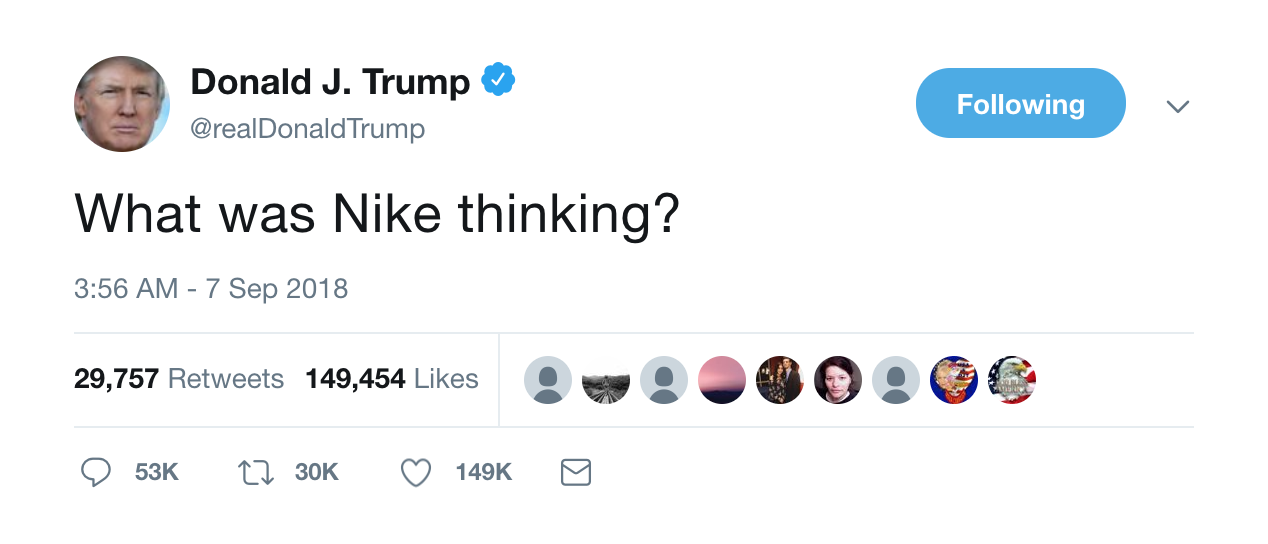Nike’s Kaepernick Endorsement Wasn’t Surprising
Colin Kaepernick, the newest face of Nike's "Just Do It" campaign (source)
Nike doesn’t sell shoes or shirts or socks in its advertisements anymore. It doesn’t need to.
Today, the multi-billion dollar athletic apparel company sells dreams. It reminds its consumers that athletes, no matter what they’ve accomplished, are still people.
Nike is a business, yes — one with executives who are interested in the bottom line; one with consultants who don’t encourage taking risks unless they’re thoroughly calculated; one whose moral obligation to American society is about as malleable as its “Just Do It” slogan.
But it has always transcended sport.
Nike provided the platform for LeBron James, in 2010, to ask “What should I do?” after he left his fanbase feeling betrayed by his move from Cleveland to Miami. It’s where Kevin Durant, after his first NBA Championship in 2016, said that he was finished coming in second place. It’s where Serena Williams, earlier this year, narrated her experience of becoming one of the best athletes of all time: “I’ve never been the right kind of woman. Oversized and overconfident. Too mean if I don’t smile. Too black for my tennis whites. Too motivated for motherhood. But I’m proving, time and time again, that there is no wrong way to be a woman.”
So when Nike made the decision to drop a video and unveil a billboard that featured one of the most prominent social activist athletes of the modern era, Colin Kaepernick, the company didn’t deviate from its established marketing plan. In fact, it stayed consistent — bolstering its commitment of giving a voice to the athletes that endorse it, and joining a movement so that its “Dream Crazy” campaign is memorable and lucrative.
A tweet from President Trump's personal account following Nike's release of the ad (source)
In so many words, Nike didn’t change. Its audience, though — from the young consumer market who can now be fashionable and socially conscious at the same time, to the vehement adversaries who burned their Nike shoes, cut their Nike socks, and fueled the #BoycottNike Twitter trend in protest — did change.
And that’s why this strategy is so remarkable: it showed that — in this time when every facet of American life is connected to politics (thanks, in part, to a President who devotes his time to speaking out against movements like this) — there are very few messages that everyone can support.
Not even a message as seemingly universal as one centered around chasing your dreams: “Believe in something, even if it means sacrificing everything.”
There is a necessary context to consider, of course. The message doesn’t stand alone; it’s spoken by a controversial figure, Kaepernick, a former quarterback who is most famous for kneeling during the playing of the national anthem prior to a 2016 preseason game. In an interview following the contest, he explained that he refused to “stand up to show pride in a flag for a country that oppresses black people and people of color.”
Around this statement, America separated like oil and water.
People against him disagreed with his methods and message. They argued that Kaepernick is hypocritical for so directly and blatantly protesting a flag — which stands for a constellation of American values — in support of a relatively narrow social cause. They asserted that a football field, one of the few non-political forums in America, is not the setting where these protests are appropriate. They asked how Kaepernick could criticize the country from such a place of privilege: You reaped reward from this country’s equality of opportunity, one of the many doctrines that the flag that you’re protesting embodies. How can you protest it when you’re its beneficiary?
Others joined Kaepernick’s mission, arguing that he was using his platform to make a statement that needed to be said. The statement being that he was an athlete, sure, but also a human — vulnerable to the social realities around him, capable of thought outside the X’s and O’s of football.
Kaepernick and teammates kneeling before a 2016 regular season game (source)
Nike had to have realized that by letting Kaepernick spearhead its newest campaign, it would alienate some people in the former group.
But the company also knew that its values of telling stories, humanizing athletes, and selling dreams aligned perfectly with Kaepernick’s image.
Nike made a business decision, but it was one that allowed the company to stay true to itself. There’s something virtuous about that.
And if by staying true to its brand, one that has been applauded for uniquely empowering athletes for decades, it is coming in conflict with a certain group of people, including the President — there is a more worrying query worth discussing:
What does this say about Nike’s audience today?



